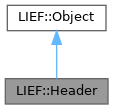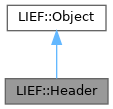LIEF::Header Class Reference
#include <Header.hpp>
Inheritance diagram for LIEF::Header:

Collaboration diagram for LIEF::Header:

Public Types | |
| enum class | ARCHITECTURES { UNKNOWN = 0 , ARM , ARM64 , MIPS , X86 , X86_64 , PPC , SPARC , SYSZ , XCORE , RISCV , LOONGARCH , PPC64 } |
| enum class | ENDIANNESS { UNKNOWN = 0 , BIG , LITTLE } |
| enum | MODES : uint64_t { NONE = 0 , BITS_16 = 1LLU << 0 , BITS_32 = 1LLU << 1 , BITS_64 = 1LLU << 2 , THUMB = 1LLU << 3 , ARM64E = 1LLU << 4 } |
| enum class | OBJECT_TYPES { UNKNOWN = 0 , EXECUTABLE , LIBRARY , OBJECT } |
| Public Types inherited from LIEF::Object | |
| template<class T> | |
| using | output_t = add_pointer_t<decay_t<T>> |
| template<class T> | |
| using | output_const_t = add_pointer_t<add_const_t<decay_t<T>>> |
Public Member Functions | |
| Header ()=default | |
| Header (const Header &)=default | |
| Header & | operator= (const Header &)=default |
| ~Header () override=default | |
| ARCHITECTURES | architecture () const |
| Target architecture. | |
| MODES | modes () const |
| Optional features for the given architecture. | |
| std::vector< MODES > | modes_list () const |
| MODES as a vector. | |
| bool | is (MODES m) const |
| OBJECT_TYPES | object_type () const |
| uint64_t | entrypoint () const |
| ENDIANNESS | endianness () const |
| bool | is_32 () const |
| bool | is_64 () const |
| void | accept (Visitor &visitor) const override |
| Public Member Functions inherited from LIEF::Object | |
| Object () | |
| Object (const Object &other) | |
| Object & | operator= (const Object &other) |
| Object (Object &&other) noexcept=default | |
| Object & | operator= (Object &&other) noexcept=default |
| template<class T> | |
| output_t< T > | as () |
| template<class T> | |
| output_const_t< T > | as () const |
| virtual bool | operator== (const Object &other) const |
| virtual bool | operator!= (const Object &other) const |
| virtual | ~Object () |
Static Public Member Functions | |
| static Header | from (const LIEF::ELF::Binary &elf) |
| static Header | from (const LIEF::PE::Binary &pe) |
| static Header | from (const LIEF::MachO::Binary &macho) |
Member Enumeration Documentation
◆ ARCHITECTURES
|
strong |
◆ ENDIANNESS
|
strong |
◆ MODES
| enum LIEF::Header::MODES : uint64_t |
◆ OBJECT_TYPES
|
strong |
Constructor & Destructor Documentation
◆ Header() [1/2]
|
default |
Referenced by from(), from(), from(), Header(), operator<<, and operator=().
◆ Header() [2/2]
|
default |
References Header().
◆ ~Header()
|
overridedefault |
Member Function Documentation
◆ accept()
|
overridevirtual |
Implements LIEF::Object.
◆ architecture()
|
inline |
Target architecture.
◆ endianness()
|
inline |
◆ entrypoint()
|
inline |
◆ from() [1/3]
|
static |
References Header().
◆ from() [2/3]
|
static |
References Header().
◆ from() [3/3]
|
static |
References Header().
◆ is()
|
inline |
◆ is_32()
|
inline |
References BITS_32.
◆ is_64()
|
inline |
References BITS_64.
◆ modes()
|
inline |
Optional features for the given architecture.
◆ modes_list()
◆ object_type()
|
inline |
◆ operator=()
The documentation for this class was generated from the following file:
Generated by